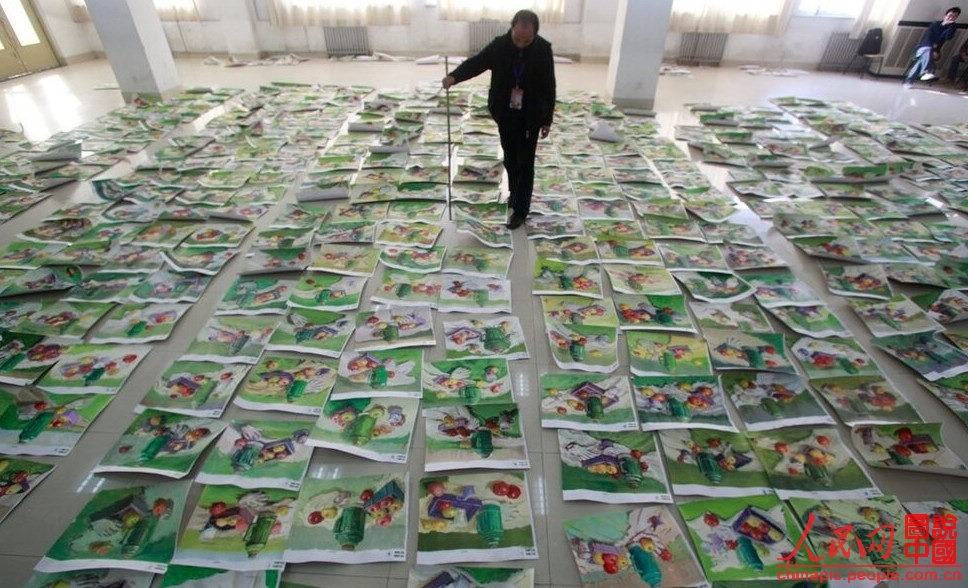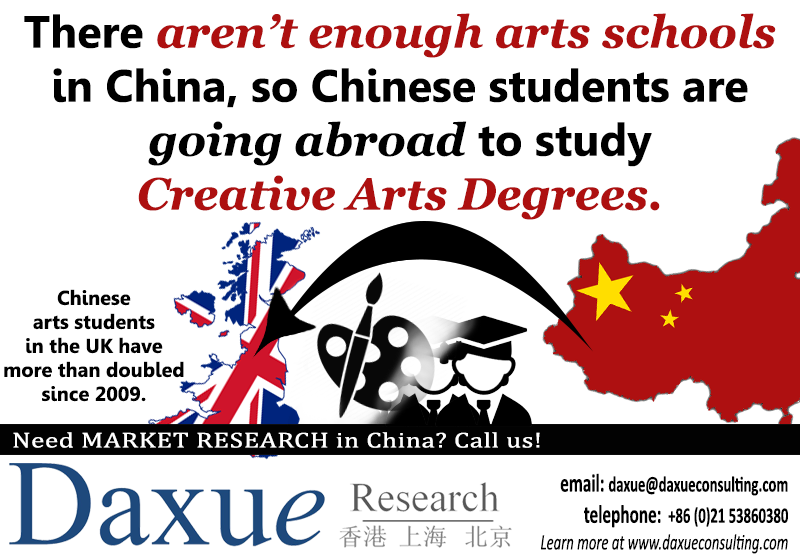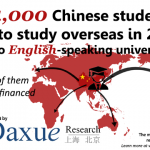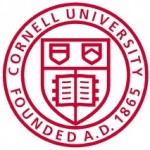Art Schools in China: more and more Chinese Art Students
Art Schools in China: a surplus of Chinese art students
Will Arts schools in China succeed in retaining Chinese students?
Today, there are very few Art schools in China. Increasing numbers of Chinese students are leaving the country to study art abroad at university and college-level. Over the last five years, universities and colleges in the UK have seen an increase of 158% in Chinese students studying creative arts. Creative arts are the second most popular field of study for Chinese students studying abroad in the UK, after business studies. For Chinese students studying in Australia, creative arts is the fourth most popular field of study, with Australia’s intake of Chinese art students growing by 85% between 2008 and 2012. There is a significant demand for creative arts study programs in China, so why are Chinese art students studying abroad? A significant factor is the lack of art schools teaching creative art courses in China.
Very few Art schools in China in spite of the rise of local market
Curator of the Times Museum in Guangzhou, Liang Jianhua, stated that besides the Central Academy of Fine Art (CAFA) in Beijing, and the China Academy of Art in Hangzhou, there are very few art schools that teach contemporary art practice.
China has become the fastest growing contemporary art market in the world. The United States has been ranked first in the global art market and has almost never been replaced. Over the last decade, the art market in China has grown at a rapid pace year-on-year and has now overtaken the United States to become the largest art market in the world in terms of revenue, accounting for 24% of world sales. Predictions of a growing economy and rising levels of individual income suggest a solid outlook for continued long-term growth in the market.
A real opportunity to attract Chinese art students abroad
Evidently, the rising demand for art in the Chinese market coupled with strong demand for art schools in China by Chinese students results in a number of opportunities for a foreign (or Chinese school) wishing to open an art school in China.
In 2018, the China Academy of Art receives around 78,000 applicants a year and enrols around 1,621 of those applicants. About 56 000 Chinese students applied to the Shandong University of Art and Design, and 1 643 students are enrolled. With only 31 good art and design schools in China, it is easy to understand why many Chinese art students make the decision to study art abroad in U.S., UK, and Australian tertiary education facilities. It is interesting to note that over the 18,290 students at the University of the Arts London, 30% of the student body is made up of Chinese students. Chinese students enrolled and applied for arts programs in the United States are growing much faster compared to engineering, law, business and management, math and others subjects.
Lower costs of tuition in China than in western countries
Tuition fees for Chinese students studying at the China Central Academy of Fine Arts – one of the most reputable art schools in China – enrolled in a four-year undergraduate bachelor degree costs 60,000RMB (US$9,387.17) is it 15,000RMB per year. To study at a U.S. or UK based academy with a similar reputation will cost a Chinese student an average of US$31,000 (192,262RMB). For example, to study at the University of the Arts London will cost £58,050 (495,823 RMB) for three years so £19,350 (165,274 RMB) per year.
Considering the higher costs of tuition in western countries and the increasing numbers of Chinese students enrolling in universities in these countries, it is clear that there are ample opportunities for education facilities to take advantage of this growing market of students. Both Chinese and non-Chinese education institutions can seize these opportunities in China and establish new art schools in the country.
Opportunities for new Art schools in China
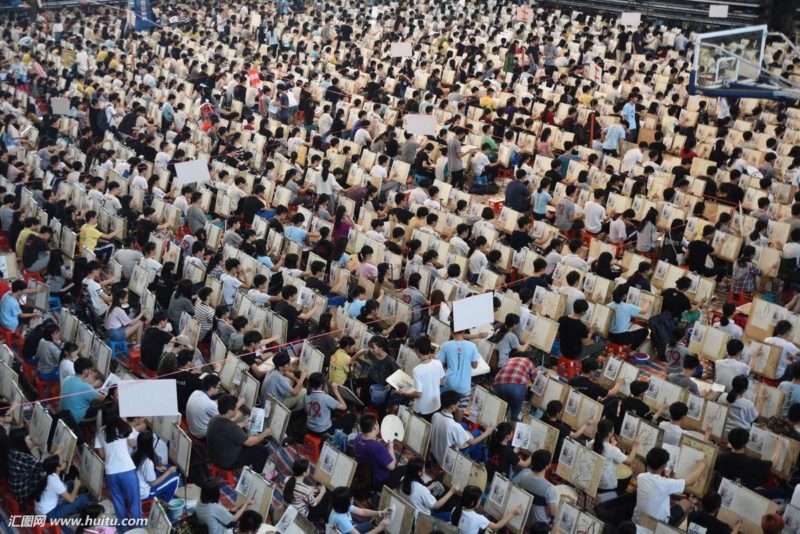
There is rising demand for students to gain skills and talents in the creative arts such as design, animation, game design, advertising and photography, and many education institutions outside of China are recognizing this. Increasing demand for good art schools in China from Chinese students combined with the lack of art and design schools available to them domestically results in the students seeking to study abroad – even when they are required to pay a lot more for tuition and living expenses. An art and design educational institution interested in expanding and opening a new school in China should consider the significant demand and opportunities this market provides. A new art and design school in China (operated either by a Chinese or non-Chinese education institution) will very quickly fill their seats with determined Chinese – and also international – art students.
Admissions process of Art schools in China
Arts examinations in China usually take place in the early part of the year

Baidu Index (百度指数) trend line for the keyword “Art School”(艺术学校) on the Chinese Internet between 2014 and 2018.
The most notables peak in searches came during the beginning of each years in 2015, 2016 and 2017, because entrance exams for art schools usually take place in January, February or March which may explain why Chinese people especially arts candidates are interested and want to try to find more information about Art Schools at this period.
Art students often need to go through the provincial examination (generally in December-January), the school exam (generally in February-March), and the National College Entrance Examination in order to successfully enter the admissions process.
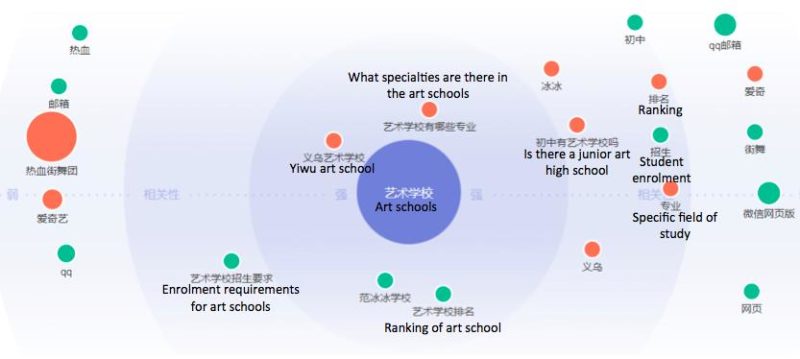
Graph of main associated keywords for «art schools » (strongly related): “ranking of art school”, “specific field of study”, “admission”. Sourced from Baidu Index (百度指数) by Daxue Consulting.
Searches using the search terms: “ranking of art school”(排名), “specific field of study” (专业), “admission and enrolment” (招生) shows that Chinese are interested in art schools and there is significant demand for knowing more about the specific field of study, and admission process, as evident in the graph above. Moreover, the ranking of the school is also very important because of the objective of Chinese students being to integrate prestigious schools.
Applying to art schools in China is a stressful process
Every year thousands of Chinese art students are taking part in the application process to get into university art programs. During the day of this practical exam, they must complete a specific set of artistic assignments, a lot of the actual scoring depends on the judges. Different provinces have different regulations and the demarcation of score lines is also different. Then the scores are ranked in numerical order and students with the highest ranked are invited to participate in another exam, the Gaokao. The National College Entrance Examination is commonly known Gaokao (高考) is an academic examination that is a prerequisite for entrance into almost all higher education institutions at the undergraduate level. The examination lasts for nine hours over a period of two days. It includes four parts: Chinese (150 points), mathematics (150 points), an English test was formerly required of all students, but now Japanese, Russian or French may be taken instead (150 points) and Comprehensive subject (300 points). For the comprehensive subject, students must choose between social-science-oriented area or the natural-science-oriented area. Students who choose social science are tested in history, politics and geography while students who choose natural sciences are tested in physics, chemistry and biology. The total score of the National College Entrance Examination is 750 points. And each Art universities will have a score requirement for the National College Entrance Examination, and students need to meet the requirement. For Art Students, National College Entrance Examination is used essentially like a test, such as a pass-fail determination for students that have made it through the first round.
More about recruiting Chinese students in foreign universities


